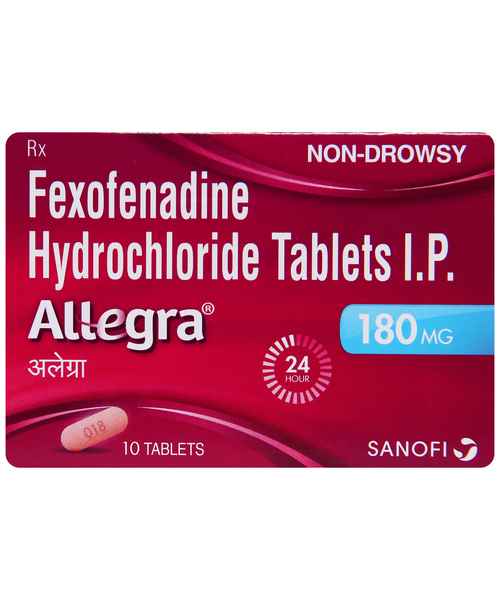allegra FEXOFENADINE
Introduction to allegra
Allegra is a widely used medication available in tablet form, primarily used to relieve allergy symptoms. Allegra effectively treats conditions such as sneezing, runny nose, and itchy eyes, making it a popular choice for managing seasonal allergies and chronic urticaria.
Composition of allegra
Allegra contains the active ingredient Fexofenadine, which is an antihistamine. Fexofenadine works by blocking the action of histamine, a substance in the body that causes allergic symptoms. This helps alleviate symptoms associated with allergies.
Uses of allegra
- Relieves sneezing and runny nose
- Treats itchy or watery eyes
- Manages seasonal allergies
- Alleviates chronic urticaria (hives and itching)
Side effects of allegra
- Common side effects: headache, dizziness, nausea
- Serious side effects: rare but may include allergic reactions such as rash, itching/swelling, severe dizziness, and trouble breathing
Precautions of allegra
Before taking Allegra, inform your doctor if you have any allergies, especially to Fexofenadine. Caution is advised for individuals with kidney problems. Avoid consuming fruit juices with Allegra, as they can reduce its effectiveness.
How to Take allegra
Allegra is typically taken as a tablet with water, and it can be consumed with or without food. It is important to follow your doctor's instructions regarding dosage and administration. For adults, the usual dose is 60 mg twice daily or 180 mg once daily. For children, the dosage varies based on age and weight.
Conclusion of allegra
Allegra, containing the active ingredient Fexofenadine, belongs to the therapeutic class of antihistamines. It is manufactured to effectively manage allergy symptoms and chronic urticaria. Allegra is a reliable choice for those seeking relief from allergies, with its key highlights being its efficacy and ease of use. Always consult your healthcare provider for personalized advice and to ensure safe usage.


Can Allegra be taken safely while breastfeeding?
Allegra is generally considered safe while breastfeeding, but it's best to consult your doctor. Limited information suggests it doesn't pass into breast milk in significant amounts. No adverse effects on breastfed infants have been reported. However, always discuss with your doctor to ensure it's the best option for you and your baby. They can provide personalized advice based on your health needs.

Can Allegra be taken safely while pregnant?
Allegra is generally considered safe during pregnancy, but it's important to consult your doctor before using it. Limited studies in pregnant women suggest no significant risk, but definitive advice is difficult due to limited evidence. Your doctor can help weigh the benefits and risks based on your specific situation and recommend the safest treatment for managing allergy symptoms during pregnancy.

Can I take Allegra with other prescription drugs?
Allegra can interact with certain medications, such as antacids containing magnesium or aluminum, which can reduce its effectiveness. Avoid taking these antacids within two hours of Allegra. Always inform your doctor about all medications you are taking to avoid interactions. They can help manage your treatment safely and effectively.

Does Allegra affect sleep?
Allegra doesn't typically cause sleep problems. Most people take this medication without experiencing changes in their sleep patterns. If you notice changes in how well you sleep after starting Allegra, talk with your doctor. Sleep problems might be related to something else, like another medication or a different health condition. Your doctor can help figure out the cause and suggest ways to improve your rest.

Does Allegra cause headaches?
Headaches are not a common side effect of Allegra. Most people take this medication without experiencing headaches. If you do get mild headaches while taking Allegra, staying well-hydrated and resting may help. You can also take over-the-counter pain relievers after checking with your doctor. For severe or persistent headaches, talk with your healthcare provider to determine if they might be related to Allegra or another cause.

Does Allegra cause stomach upset?
Allegra rarely causes stomach upset. Some people might experience mild nausea, but this is uncommon. If you do feel nauseated, taking the medication with food might help reduce discomfort. Most people take Allegra without any stomach issues. If you develop severe or persistent nausea or other stomach problems, talk with your doctor to determine if these symptoms are related to Allegra or another cause.

Does Allegra limit driving?
Allegra is generally safe for driving, as it doesn't usually cause drowsiness. However, some people might experience dizziness or light-headedness. If you feel any of these symptoms, avoid driving until they go away. When you first start taking Allegra, pay attention to how your body responds before getting behind the wheel. Talk with your doctor if you have concerns about driving while taking this medication.

Does Allegra make it hard to think or concentrate?
Allegra doesn't typically cause thinking problems or concentration difficulties. Most people take this medication without experiencing changes in mental focus or memory. If you notice problems with your thinking after starting Allegra, talk with your doctor. These symptoms might be related to something else, such as another health condition. Your doctor can help determine the cause and suggest solutions.

Does Allegra make people tired or drowsy?
Allegra doesn't typically cause tiredness or drowsiness. Most people take this medication without feeling unusually tired. If you notice you're feeling very sleepy or fatigued while taking Allegra, talk with your doctor. Your tiredness might be caused by something else, like another medication or an underlying health condition. Your doctor can help determine the cause and recommend adjustments to your treatment plan.

For how long do I take Allegra?
Allegra is usually taken for short-term relief of allergy symptoms. The duration depends on your specific needs and doctor's advice. For seasonal allergies, you might take it during allergy season. For chronic allergies, your doctor may recommend longer use. Always follow your doctor's instructions and discuss any concerns about the duration of use with them.

How does Allegra work?
Allegra is an antihistamine that works by blocking histamine, which is a substance in the body that causes allergy symptoms. Think of it like an umbrella that shields you from rain; Allegra shields your body from histamine's effects, reducing symptoms like sneezing and itching. This makes it effective for treating seasonal allergies and chronic urticaria, which is a condition that causes hives and itching.

How do I know if Allegra is working?
You'll know Allegra is working when your allergy symptoms, like sneezing, runny nose, and itchy eyes, improve. These symptoms should lessen within a few hours of taking the medication. If your symptoms persist or worsen, talk with your doctor. They may need to adjust your treatment plan or explore other options to manage your allergies effectively.

How do I take Allegra?
Take Allegra as directed by your doctor, usually once or twice daily. It's best to take it with water and avoid taking it with fruit juices, which can affect absorption. You can take it with or without food. If you miss a dose, take it as soon as you remember, unless it's almost time for your next dose. In that case, skip the missed dose and continue your regular schedule. Do not double up on doses. Always follow your doctor's specific instructions.

How long does it take for Allegra to start working?
Allegra starts working within one hour of taking it, with peak effects usually occurring in two to three hours. You should notice relief from allergy symptoms like sneezing and runny nose within this time. The full therapeutic effect may take a few days of consistent use. Individual factors like age and overall health can affect how quickly it works. Always take it as prescribed for the best results.

How should I store Allegra?
Store Allegra at room temperature, away from moisture and light. Keep it in its original container, tightly closed. Avoid storing it in humid places like bathrooms. No refrigeration is needed. Always keep it out of reach of children to prevent accidental ingestion. Check the expiration date regularly and dispose of any unused or expired medication properly.

Is Allegra effective?
Allegra is effective for relieving allergy symptoms like sneezing, runny nose, and itchy eyes. It works by blocking histamine, which is a substance in the body that causes allergy symptoms. Clinical studies show that Allegra significantly reduces allergy symptoms compared to placebo. It is a well-established treatment for seasonal allergies and is generally well-tolerated by most people.

Is Allegra safe for the elderly?
Allegra is generally safe for the elderly, but they may be more sensitive to its effects. Older adults are more vulnerable to side effects like dizziness or drowsiness. It's important to start with a lower dose and monitor for any adverse reactions. Always consult a doctor for personalized advice and to ensure safe use of Allegra in elderly patients.

Is it safe to exercise while taking Allegra?
Yes, it's safe to exercise while taking Allegra. This medication doesn't typically limit exercise capacity. However, if you experience dizziness or drowsiness, which are rare side effects, be cautious during physical activity. Listen to your body and avoid strenuous activities if you feel unwell. Stay hydrated and rest if you notice any unusual symptoms during exercise.

What are Allegra possible harms and risks?
Common side effects of Allegra include headache, dizziness, and diarrhea. Serious side effects, though rare, include difficulty breathing, swelling, and severe allergic reactions. If you experience serious side effects, seek medical attention immediately.

What disease or symptom is Allegra used for?
Allegra is used to treat allergy symptoms like sneezing, runny nose, and itchy eyes. It's effective for seasonal allergies and chronic urticaria, which is a condition that causes hives and itching. Allegra works by blocking histamine, which is a substance in the body that causes these symptoms. It can be used alone or with other therapies, depending on your doctor's advice.

What is Allegra?
Allegra is an antihistamine used to relieve allergy symptoms like sneezing, runny nose, and itchy eyes. It works by blocking histamine, which is a substance in the body that causes allergy symptoms. Allegra is effective for treating seasonal allergies and chronic urticaria, which is a condition that causes hives and itching. It is generally well-tolerated and can be used by adults and children.

What is the usual dose of Allegra?
The usual dose of Allegra for adults is 60 mg twice daily or 180 mg once daily, depending on the condition being treated. For children, the dose may vary based on age and weight. Always follow your doctor's specific dosing instructions. The maximum recommended dose should not be exceeded. Dose adjustments may be necessary for special populations, such as the elderly or those with kidney problems.

Who should avoid taking Allegra?
Allegra should not be used by people who are allergic to it or its ingredients. Serious allergic reactions, which cause rash, hives, or swelling that makes breathing difficult, require immediate medical help. Caution is needed for people with kidney problems, as dose adjustments may be necessary. Always consult your doctor about any concerns and inform them of any other medications you are taking to avoid interactions.
Available in 3 variations

bottle of 100 ml Suspension

strip of 10 tablets

strip of 10 tablets

















.svg)
